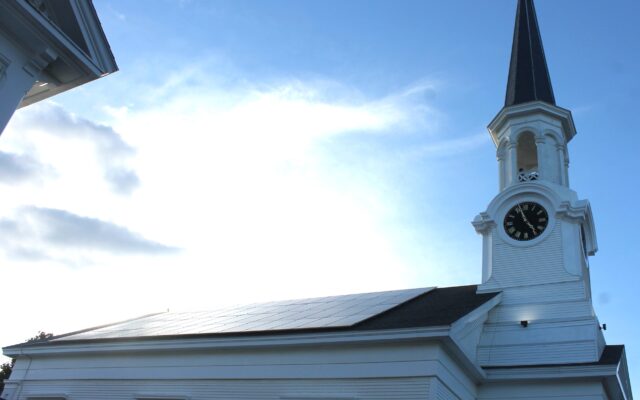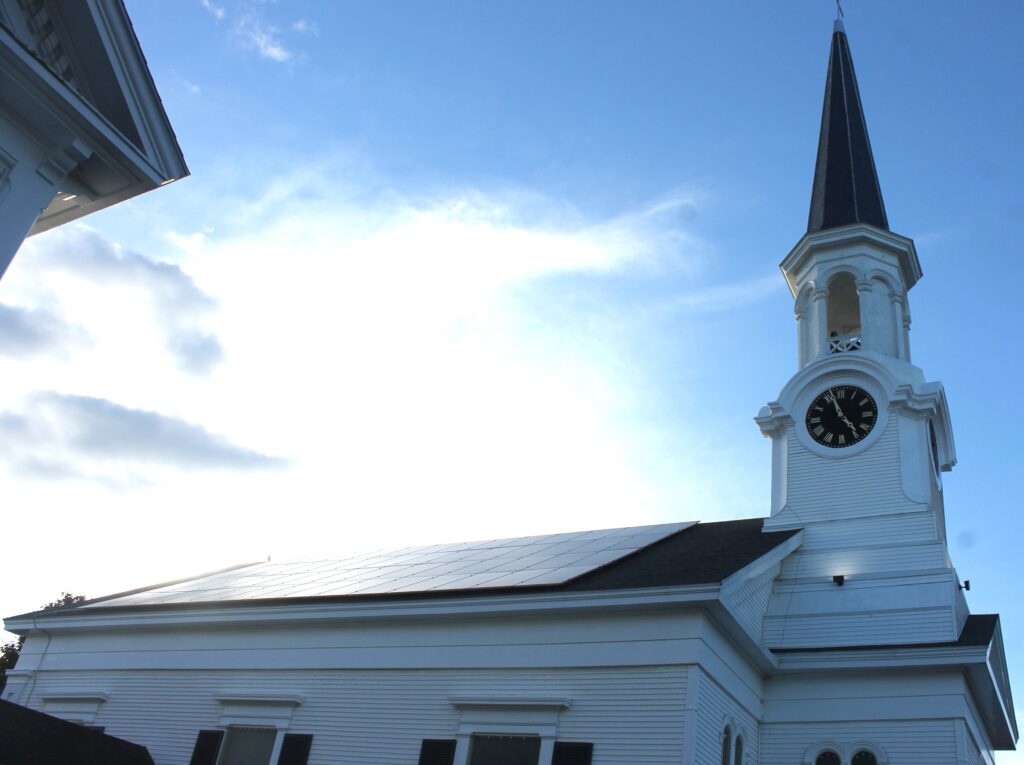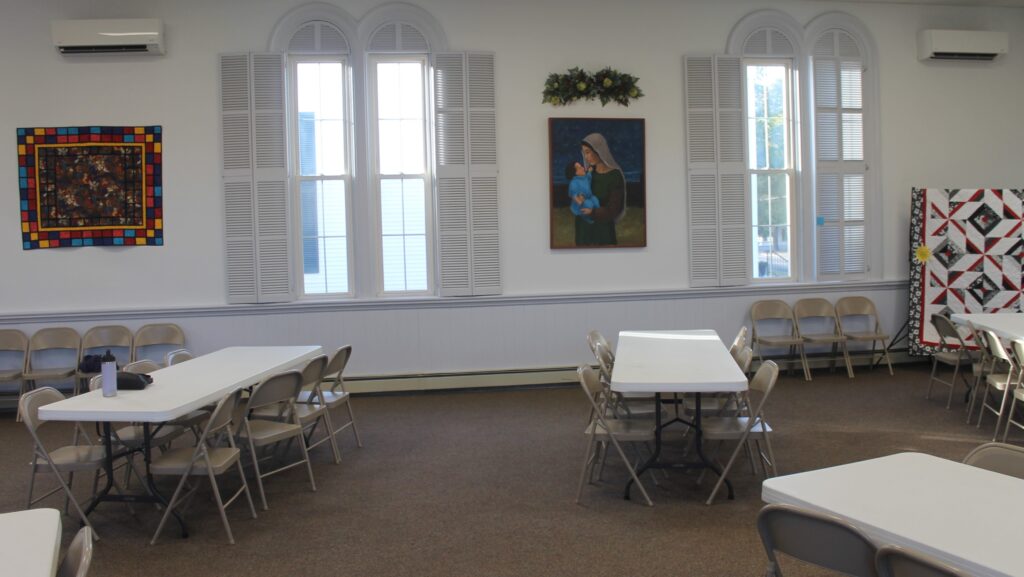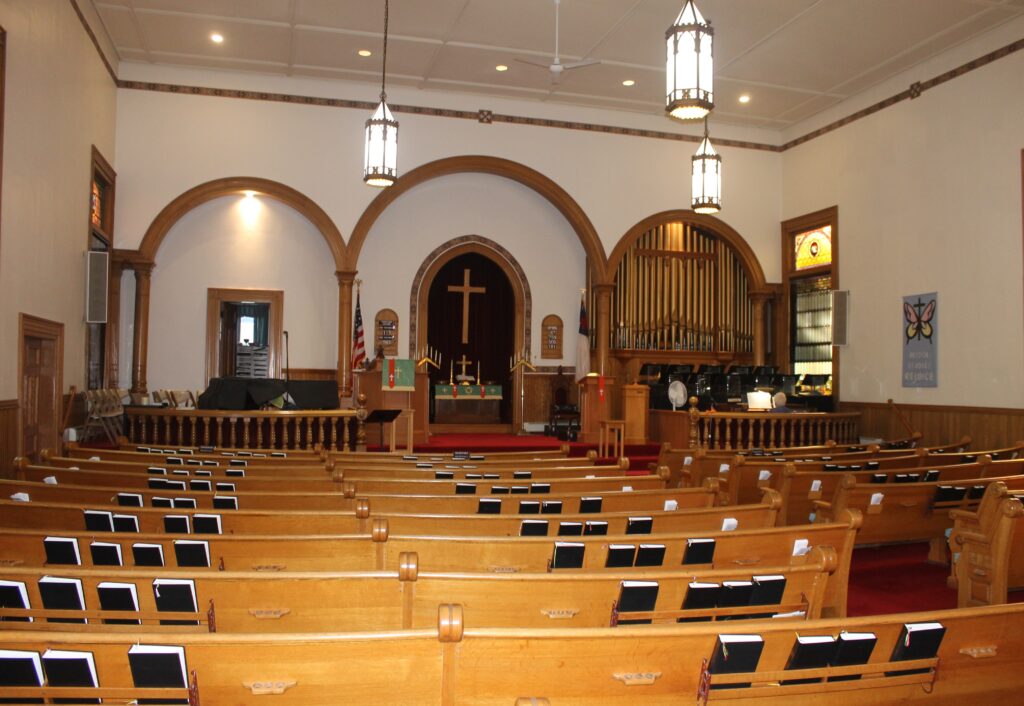
Dover-Foxcroft Congregational Church working to become carbon neutral
DOVER-FOXCROFT — In 2023 members of the Dover-Foxcroft Congregational Church set a goal for the church to be carbon neutral by the end of the year. Once various measures to become more energy efficient started to be carried out they realized they would not reach the goal in full in that timeframe — a readjustment placed the timeline into 2025. Church members also saw that there are steps that other people and organizations in the community can take without too much difficulty that can reduce their carbon footprint and save money.
“We started this vision back in 2021 with Pastor Steve Hastings who was here at the time,” said George Barton of the Dover-Foxcroft Congregational Church’s Green Team. “We wanted to commission an engineering study of our whole footprint here and we’re talking about 13,000 square feet of space that we’re dealing with” including the church, parsonage, fellowship hall, and Sunday school wing.
“We took a number of things that anyone can do, we upgraded the insulation,” Barton said, mentioning they had a list of tasks from the engineers. “Some things are going to take a longer period of time such as replacing windows with better sealed window units.”

SOLAR PANELS AT WORK — Last year the Dover-Foxcroft Congregational Church had solar panels installed on the roof beneath the steeple. The panels have drastically cut down on electricity expenses as the church is working toward becoming carbon neutral by next year.
Heat pumps were installed for about $22,000 in the parsonage in 2022 and church buildings, new ceiling insulation was put in for another $22,000, and a solar array was installed on the roof below the steeple. Sundog Solar of Searsport installed a $133,800 solar panel array on the roof last year.
“We ran a capital campaign here in the church and raised over $80,000 towards that solar array in six weeks,” Barton said.
“I think that speaks to the understanding of the congregation that is this church that doing something to preserve the environment as we know it is an important thing, a mission just as feeding the hungry is a mission,” he said. “Taking care of the environment is a mission in line with the encyclical the pope put out saying ‘it’s God’s creation, you ought to protect it.’”

HEAT PUMPS — Heat pumps provide efficient warmth and cooling at the Dover-Foxcroft Congregational Church Fellowship Hall.
“We’re called to be good stewards of all resources whether it’s financial or natural resources,” Pastor Rachel Dobbs said.
“It seemed like a super big project to take on and once we started looking at the different types of funding that were available and some of mechanisms that were in place that would allow us to invest in solar, it was a big job but it was more manageable I think than we thought it was,” she said. “The payoff has certainly been pretty substantial.”
“So we adopted a mission to become carbon neutral,” Barton said. “First thing efficiency, conservation. Second thing, new technology, moving away from oil boilers toward electric supply, solar clean energy.”
Barton said in 2022 the church used 4,900 gallons of oil, cutting this figure down to 3,500 in 2023, and then 1,600 so far in 2024. “So we are seeing a reduction in heating oil and cost benefit,” he said.

PLACE OF WORSHIP — The sanctuary of the Dover-Foxcroft Congregational Church on West Main Street.
“In 2022 we spent almost $6,700 on electricity, last year it was $742,” Barton said.
“We are just coming up on a year of full capacity of solar in October,” Dobbs said.
“It’s not just about getting carbon neutral, it’s about saving money,” Barton said, saying the church is seeing payback from its capital investment.
Jan Barton said by spending less on oil and electricity “that means we can spend more of that money in other directions, helping out the food cupboard.”
Members of the congregation donated the $80,000 for the solar system.
“We had some substantial donors but there were a lot of people that were donating $500, $100,” George Barton said, saying there was little pushback to the green initiative
“There were a few people who felt it was important to make a bigger investment so they took from a stock portfolio or savings that they might have used elsewhere and put it toward that because they believed in the purpose of carbon neutrality which is pretty amazing,” Dobbs said.
Barton said 10 families contributed nearly half the costs and then about 100 other families funded the rest.
“It went quickly, we had spent weeks talking about it and the need to be carbon neutral within the congregation longer really,” Dobbs said. “Having that on-going dialogue I think people knew already how important that was and had an idea of what that could be like.”
“It seemed to be a natural fit that people responded to, the technology has been around long enough that everybody is familiar with how things work and then to just look at the cost-benefit analysis on top of that it was kind of a no-brainer,” she said.
The Dover-Foxcroft Congregational Church has about 100 registered members and more friends and supporters within the community.
“We have a significant membership that is diverse, that worships with us online Sunday morning,” Barton said. He mentioned IP addresses from other New England states, Florida, Tennessee, Idaho, Canada, the Philippines have viewed services online.
“At this point we are producing on the order of almost 60,000 kilowatt hours a year which meets our current needs and should be adequate when we go to the final push of putting the rest of the heat pumps in the sanctuary,” Barton said. He said the church will have an adequate electric supply without having to buy off the grid, remaining grid connected with CMP being the banker of excess electricity.
He said as of Sept. 12, 43,272 kilowatt hours were banked with CMP.
“Those sunny days we make quite a bit of electricity,” Dobbs said, with about 5,000 kilowatt hours a month.
“One of the things that the solar supports well is our ability to host other groups that use our space, we have homeschool groups that come in, Downeast Horizons, Pine Tree Hospice, Boys Scouts,” she said, with the group’s utility usage not being an issue.
Barton said the church is working with the town of Dover-Foxcroft to become a heating and cooling center.
“The heat pumps provide the air conditioning we didn’t have at all before,” Jan Barton said.
Dobbs said the church has been at the West Main Street location for 170-plus years and the green initiative feels like a renewal of the historic mission to keep the doors open to welcome people and keep them comfortable in line with the culture of the church.
Cindy Freeman Cyr of the green committee said the hope is to help other people see that they too can become energy efficient and the church can offer guidance. “There are a lot of resources available, financial assistance now for heat pumps,” she said.
Barton said most of the installers offered payment installment and financing at more reasonable rates than he had thought. He said there is help from Efficiency Maine, tax credits from the federal government and even non-profits can take advantage of Inflation Reduction Act with tax refund to help offset costs.
“Our next step is we are planning now how to execute with heat pumps in the sanctuary itself,” he said, with oil being used for this space and heat pumps would cool in the summer.
“It’s a little tricky to balance the needs of a historic space with the heating and cooling that needs to happen but long-term it’s better for the space to be humidity and climate controlled better than it is,” Dobbs said. “Also in terms of carbon neutrality, not using fossil fuels and energy savings,” so this will be the topic of future conversations amongst the congregation.
“The learning and education that we have undertaken as a group within the church has really gotten us to think about those things we don’t normally spend a lot of time thinking about,” she said.
Freeman Cyr said at first she thought no one would want to see solar panels on the old slate roof. “In general our society has rapidly come around to see the value, so that amazed me,” she said.
“We are also looking at other things like how are we using plastics, paper towels,” Freeman Cyr said, mentioning cutting down on paper cups for coffee. “Consuming as little as possible, modeling for everybody.”
Barton said community dinners served at the church used to have styrofoam containers but now food comes in recyclable paper goods. “We have made that change to eliminate a waste stream, at least now it’s compostable or burnable without contributing too much to carbon footprint,” he said.
An idea for the future is an environmental action book, similar to a collection of recipes, in which individual families share some tips they have for at home and at work.
“It’s empowering to help people think about ‘what am I doing on a daily basis that matters?,’” Freeman Cyr said. “How are we supporting people’s emotional and spiritual wellbeing in another way?”
Barton said another idea for the future is to have EV chargers installed at the adjacent municipal parking lot; there is a plug-in at the parsonage.
“Because it’s centrally located, it’s a town lot, it would be a huge benefit to anyone who is visiting,” Dobbs said.
Pellet boilers are being looked at. Barton said the technology has improved to the point where this method of heating is practical but the industry is not yet completely carbon neutral due to the methods of transportation.
The church’s commercial kitchen stove is propane-powered and many in the community are comfortable using it. “It would be a challenge to replace it with something such as an induction kitchen stove which would be the cleanest way to go,” he said.
“You don’t have to do it all at once, people looking at their own homes, every little thing that you do makes a difference,” Jan Barton said about what she hopes people take away from what the church has done.
Freeman Cyr said residents can start by checking their windows to see if they are losing heat.
George Barton said WindowDressers has affordable inserts that help with this. He said Efficiency Maine offers home heat audits that are essentially free which can help residents set priorities and see what they can address first.